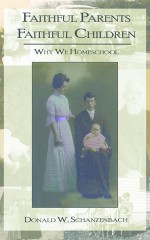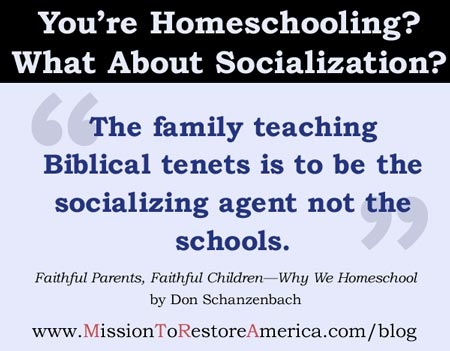Is Socialization a Problem for Homeschoolers?
This post is the fifth, and final, post in a five post series about homeschooling. All of these posts are previews of topics I cover in more detail in my book Faithful Parents, Faithful Children which is available today for FREE in the Amazon Kindle store, this is the last day to get it free. It is always available in print in our store. If you want to continue to connect with us, Like our Facebook page, and join our growing community. Today’s preview is an excerpt from the chapter on socialization. This is, after all, one of the most commonly heard objections to homeschooling your children.
If You Homeschool, You’ve Heard, “What About Socialization?”
…..Checking Webster’s 1828 Dictionary will verify that the words socialize and socialization were not yet in use at that date. The fact that the words did not exist is instructive. It gives us clues about how people thought about the development of their children. We can certainly determine that there was no mind-set anything like modern thinking on this subject. When the word sociable was used it meant, “ready or disposed to unite in a general interest.” To be sociable meant that you would associate with someone. That is very much different than what is meant when people talk about the need to socialize children today.
According to the 1983 American Heritage Dictionary the word socialize means:
- To place under public ownership or control.
- To convert or adapt to social needs
- To take part in social activities
I will argue that all three of these definitions may be accurately used to describe the socialization occurring in American schools today, especially in public schools. I will also argue that the whole concept of socialization is unbiblical at its root. The ideas of placing under public ownership and converting or adapting to social needs are particularly onerous.
Public Education Puts the School in Place of Parents
Anyone that has worked to understand Christian worldview issues will find their attention electrified at the dictionary definitions above. The contrasts with Biblical thought provoke alarm. The word socialize, and its attendant definitions, capture our interest because they so succinctly portray the nature of our present American society, particularly as applied to children.
When children are socialized, they are, by definition, being placed under “public ownership or control.” The inception of that government ownership and control typically originates when the soon to be married couple obtains a marriage license. This license, once used only to license marriages for slaves, is now the unquestioned norm for all citizens including Christians. A marriage license makes the civil government a contractual party to the marriage, and a holder of legal rights over the fruit of the marriage—namely the children. Therefore, in most cases, Christian families are begun with the civil authority having a strong measure of legal sway over their newly formed unions. There are many serious implications to this, but what we are focusing on in this context is the blitheness with which Christian parents subsume their God-given office to civil authority. This practice opens a window for us into the mind of the twenty-first century Christian in America. It demonstrates how uncritical is our thinking and our acceptance of intrusion by civil government. We accept socialist legal control without a yawn, and we would never get stinky over such an accepted practice. We do not want to be found in contest over anything that is normal, for the approbation of public antipathy is too much to bear. After all, it is only a minor compromise.
Public and Private Schools Control Family Life
Having entered the relationship with their government under these terms, it is only natural to present the child for official instruction at age five. Dutifully, mom and dad bring their little charges to preschool or kindergarten at the officially sanctioned government location. Here, the child is duly registered for a thirteen year stint under the watchful eye of the local authorities. Of course Johnny or Suzie may occasionally receive permission for a short absence. Yet, everyone knows who is in charge, it is the party giving permission. Coercive, compulsory attendance laws keep the sheep corralled under government programs. Parents may bear them away for a short vacation, but the return of the children is fully expected. Public ownership has then been established. Even if public education were to allow more study at home, education leaders would continue to pursue the same goals as shown by a letter received by Charlotte Iserbyt from the Director of the office of Libraries and Learning Technology, U.S. Department of Education stating,
In the future all education will take place in the home, using computer-assisted-instruction, but…we will always have the school buildings for “socialization purposes.” [Emphasis mine]
Further evidence concerning the attitude of government authorities toward ownership of children may be found in the rapidly-growing movement to medically treat students without the knowledge of parents. We have also seen repeated attacks on homeschool families by social service departments, trying to drag them back into the government school systems under threat of taking away their children. HSLDA (Homeschool Legal Defense Association) has been the saving defense for many of these families. The stories are available monthly in their publication. The popular use of the term “human resources” by school planners to refer to students should also give us pause. For exactly whom are they to be resources? Is this really the correct perception of the student, as a resource? I thought the school and its teachers were to be the resource for the students. This appears to be a more serious version of the old bait and switch.
Children Should Be Socialized by Family Not School
All of this to say, that the government claim to ownership of our children is a present and growing problem. It is a direct attack on the Christian family. This is part of what it means to socialize our children, and helps explain why we should not be trying to socialize them. The Bible sets parents over the child, not the civil authority. The family teaching Biblical tenets is to be the socializing agent not the schools.
For Christian Culture,
Don Schanzenbach
Related Articles
Is the Biblical Command to Homeschool for Us Today?
Are All School Subjects Religious—Even Math?
Public Schools Teach Children that God is Irrelevant
The Bible Must Be the Basis of Christian Education


Leave a Reply